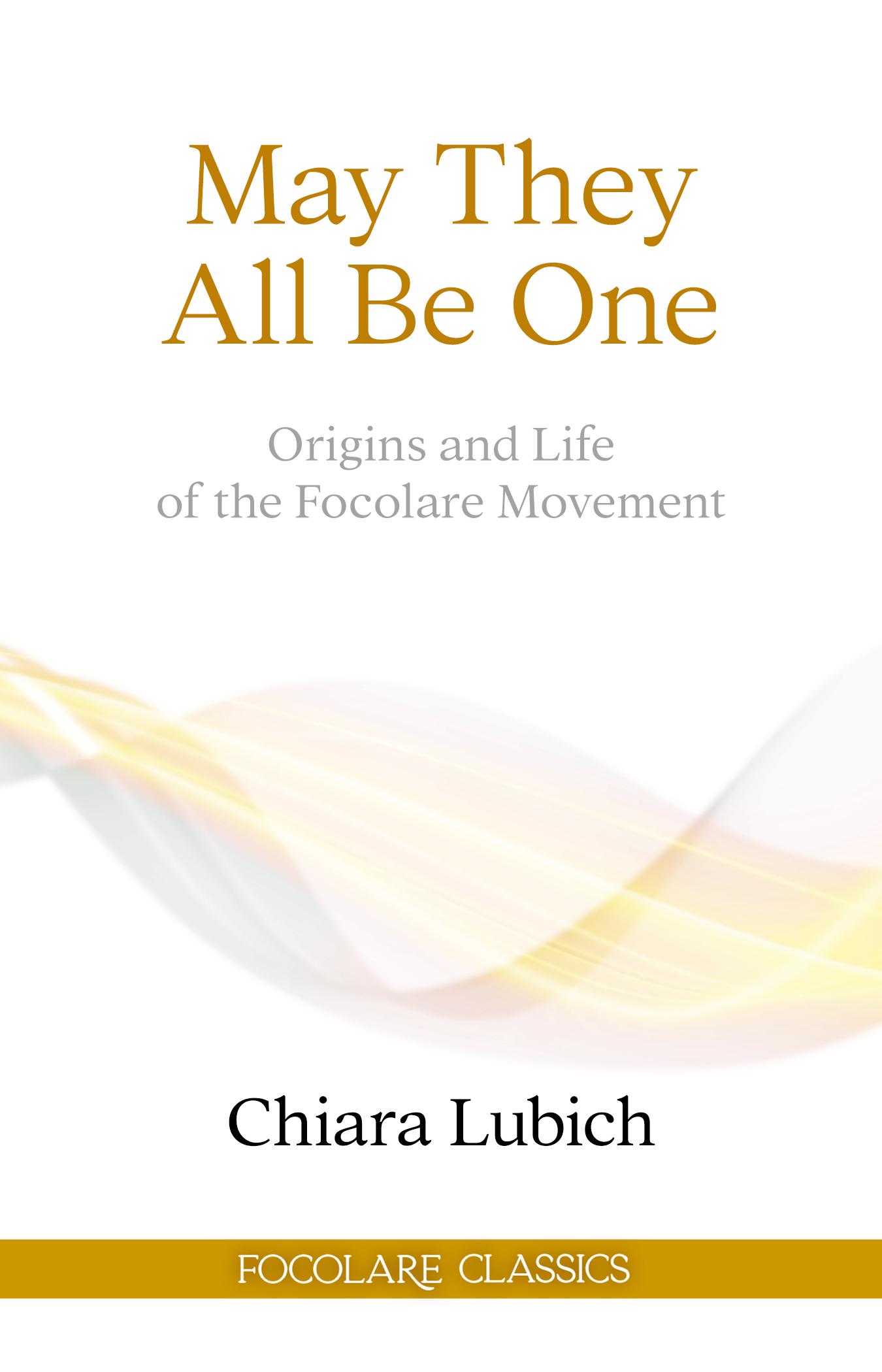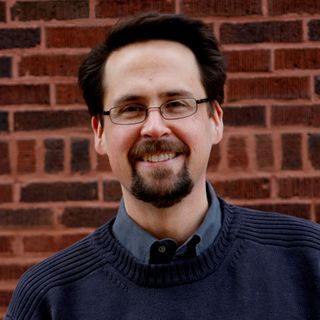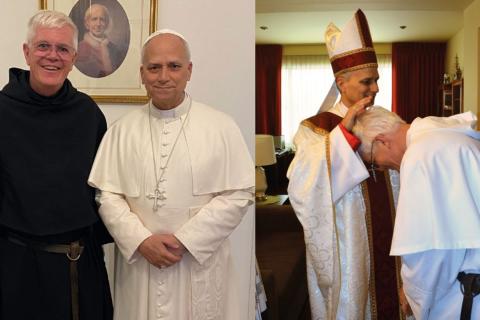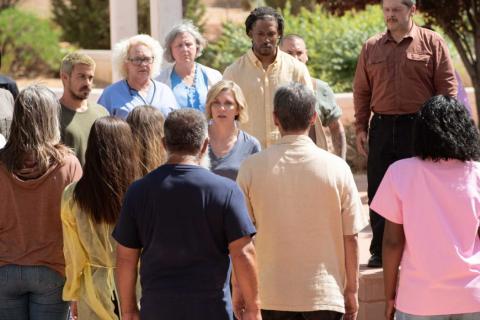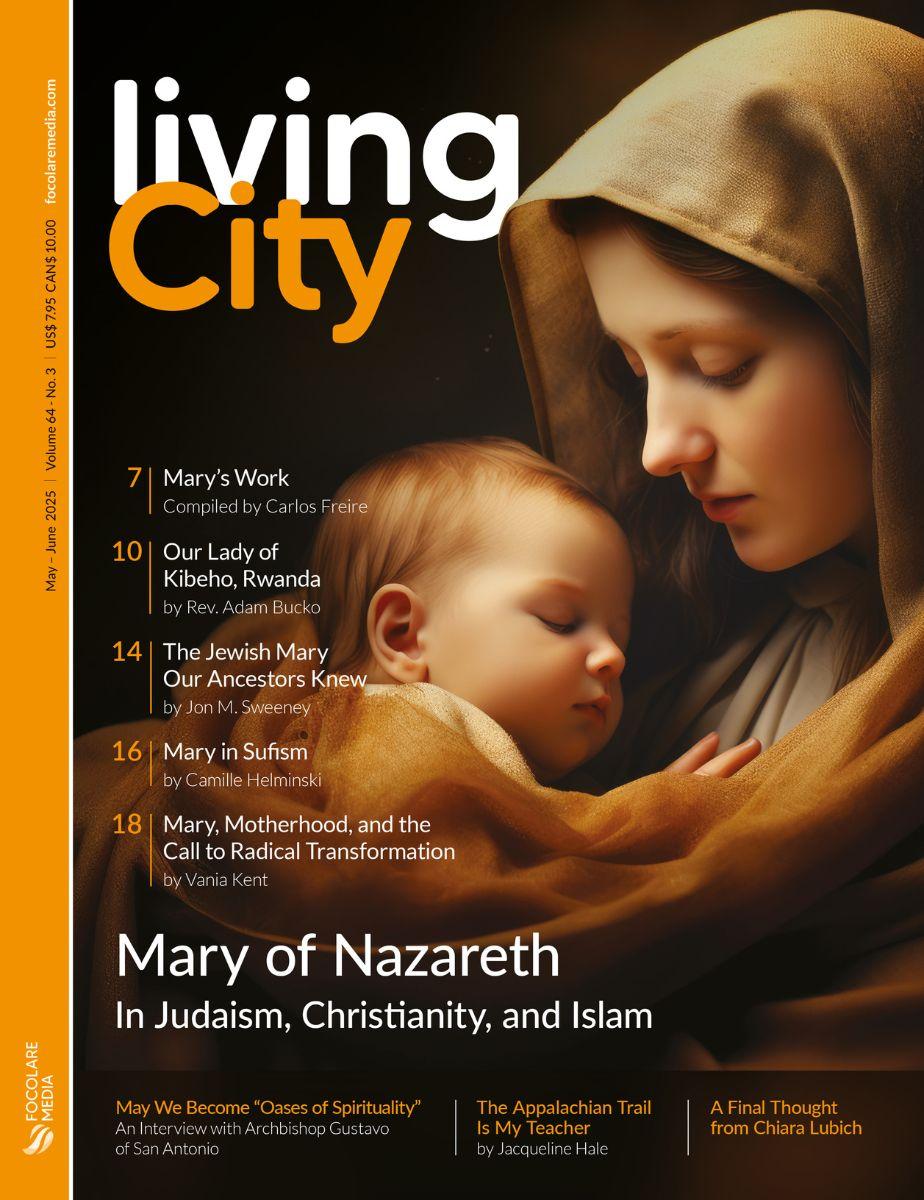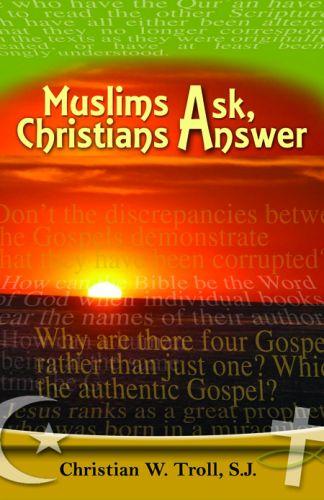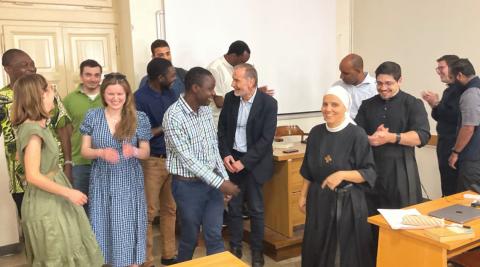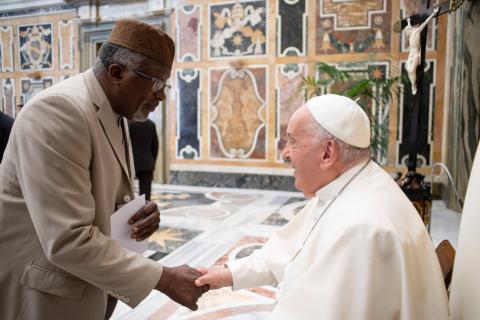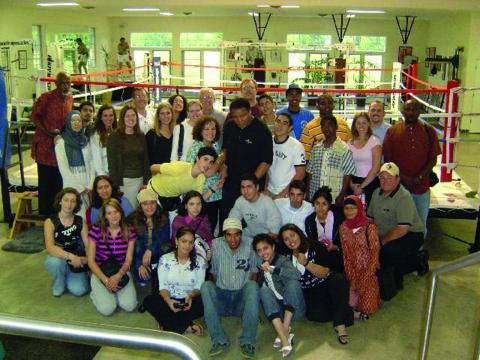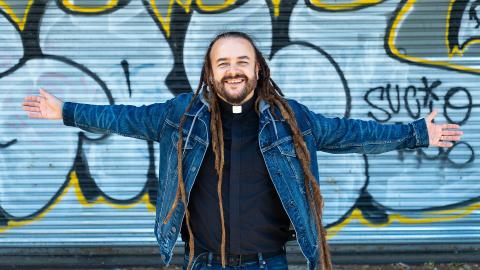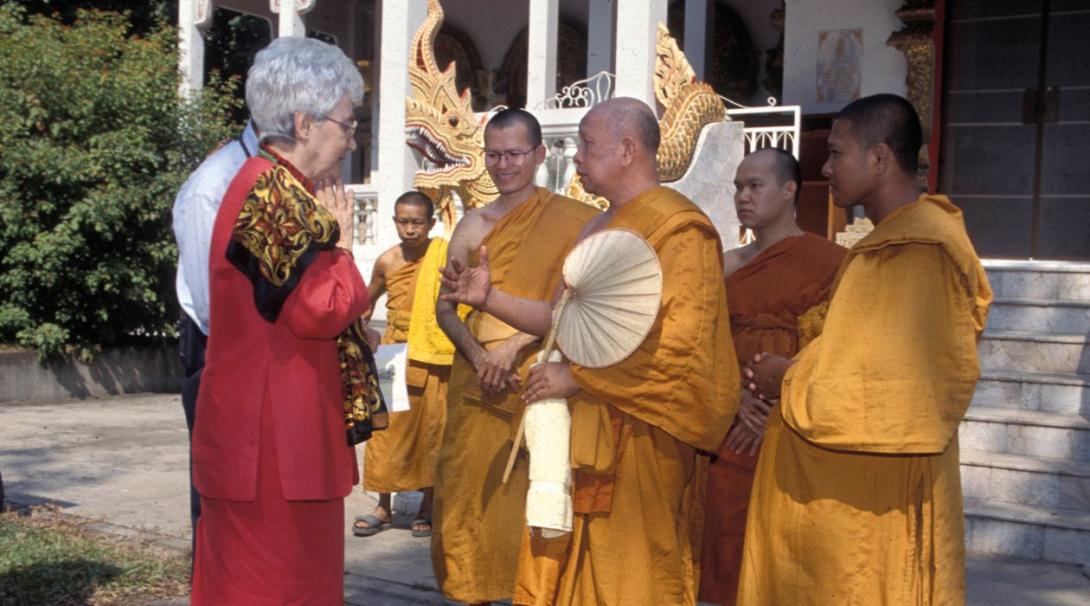
Photo © Marcello Casubolo – CSC Audiovisivi
This in-person interview was conducted between Focolarina Varaporn Phongphit (“Paviss”) and Buddhist monk Ven. Phrabhavanadhammapirach Vi., abbot of Wat Rampoeng Tapotaram in Chiangmai, Thailand, on October 21, 2023 at Wat Rampoeng Tapotaram. In face-to-face encounters with the abbot, he is customarily addressed as Ajahn Suphan (meaning Teacher/Master Suphan). Several notes appear at the bottom of the interview, to explain certain terms that are used.
This conversation is not only interesting for its history in the Focolare and interfaith relationships, but in how it includes important Buddhist teaching in the spirit of Chiara Lubich.
-The Editor
Phra Ajahn Suphan, could you tell us when did you meet Chiara Lubich? How, where, and on what occasion?
Greetings, Ms. Paviss, Metta and representatives of the Focolare who come to interview me today.
In getting to know Mother Chiara, this image must be credited to another Buddhist monk, Phra Ajarn Tong Sirimangalo, also known as Luang Pu Thong, who invited Mother Chiara to visit us at temple Wat Ram Poeng Tapotaram. This allowed us to get to know Mother Chiara, with Luang Pu Thong and Ajahn[1] Mahathongratana Thavorn [Luce Ardente], who invited Mother Chiara to share her life experience as a Christian.
After that occasion, I had the opportunity to follow Luang Pu Thong to Italy to attend the first Buddhist-Christian Symposium with Mother Chiara [in 2004], and another four times to this kind of symposium, and an interreligious dialogue meeting of representatives of six religions in 2014 in Rome, organized by the Focolare Movement. I also had a chance to participate in religious seminars at the Vatican [in 1999]. Through all these meetings I had a chance to meet Mother Chiara.
What impression did Chiara make on you?
Mother Chiara, if we speak like Thais and Buddhists, she is a great upasika. During the Buddha’s time, there were Buddhists who were not ordained. What we call upasakas, who have distinctive characteristics. It refers to one who is able to take the teachings of the Buddha and teach others to understand the Dharma, to access the Dharma, and Mother Chiara is an upasika.
Mother Chiara is a Christian who has faith in the teachings of God in the Judeo-Christian tradition. The fact that she had tried to spread the teachings of Jesus Christ shows her faith and devotion in the teachings of the Bible and the Gospel. And the way of life of Chiara through which these have been expressed is not only beneficial to oneself, but entails a duty to spread teachings, principles, and ways of thinking.
In applying the principles of teachings of Christ, she did not keep this way of life for herself, but she passed it down to her community and diffused it widely. It became the Focolare Movement with so many members all over the world. Here is a person who has performed special duties, even more than ordinary priests or religious. She was able to [achieve much] in concrete terms. There are clear concrete results. We consider that impressive.
The possibility of applying the teachings of the religion is not exclusive to monks, priests, or religious, but the ordinary faithful person can practice these as well. A villager or householder or civilian can put Dharma teachings into practice in life. This can then be beneficial and have concrete expressions.
What matters is leading others to access Dharma teachings of their religion by living as an example, setting an example, and effectively leading others to follow that path. By being the center of the mind, not only villagers but even monks or priests can gain trust in this way.
Bear in mind that if there is no moral virtue and no good deeds and virtue, there is no way to lead people to bring themselves to the goal of peace and tranquility. Chiara was able to achieve these by using the teachings of the Gospel in her life. It became a way of life. Then she passed this to groups of people, both men and women, both priests and lay persons. This was what impressed me very much.
What would you consider of most value in the ideal she spoke of, and lived?
It is faith in religion and doctrine. This is something that we are very impressed with. Because if we have a religion that we believe in, but if we can’t bring those principles and teachings into life, it doesn’t mean anything. But Mother Chiara has chosen the teachings of her religion as a way of life. This is the ideal of life. It is very important, no matter what religion one belongs to. Being able to use that teaching as a way of life, to live. I was very impressed by the fact that Chiara loves and lives compassion concretely in a way that is tangible.
The evident result is that there are disciples. There are those who share her ideal and live her spirituality. Even though she has passed away, we as her followers should continue to live her ideal.
Has Chiara had an impact on your life in the temple, and with other monks?
Chiara, if we look at her in terms of how we look with normal eyes, well, there’s nothing much amazing, because we humans are born, grow old, get sick, and die. Right? But in terms of Dharma or religion, what we call charisma, the teaching that is in the heart, the goodness that is in her heart, we can say that she is an extraordinary person. She has had a stream of merit, a stream of goodness embedded in her mind, in her heart.
These made her able to lead the people along the path of peace, prosperity, love, and compassion towards [the fulfillment] of oneself, the Movement, and of society. For this type of person, according to what we call the Dharma path and religion, she is like a bodhisattva. If in Christianity we call her a saint, then she is a saint in the form of a lay woman and not that of a priest or an archbishop or a cardinal.
But there’s more than just morality here, because Chiara has brought the possibility for everyone from different backgrounds, religions, complexions, and languages to become one. It is generally considered that people who have this type of personality are rare—that is, in a way, she is a saint; she is oriented in support of the community, of the Movement.
Therefore, even though she is a woman, she is able to express and imbibe this value, and thus become an inspiration to priests, monks, and any believer of other religions who adhere by faith in terms of morality, love, and kindness. We are able to take her as a model, as an example, if we apply the [essential] principles, we will be able to transcend gender.[2] We should look at moral values that can be taken as a prototype, that can be a role model. This is what will bring good results.
Even in our own Buddhism, the fact is that there are villagers who are lay people, upasikas. They are examples of people who come to practice Dharma, and we see that they still do their duty. They use Dharma in their lives to benefit themselves and make their way of life progress in a good way. We, as monks, actually have to enter this path directly.
Sometimes we get too familiar. We may be too feeble or not pay enough attention to recognize upasakas, upasikas,[3] when we see villagers practicing their duty. This insight can encourage people who are priests, religious, or monks to reorient themselves toward the goals coherent to their own religious principles, be it of the Christian Teaching or the Buddhadharma, whatever it is, according to their own guidelines.
Even villagers, upasakas and upasikas, are interested in practicing Dharma. It will indirectly stimulate and teach us how we should behave in a manner consistent with our status. Being a priest, religious, or a monk is to be a spiritual leader, spiritual intellectually. Now let it happen to others. This is why we have to open our minds wider.
We have to be more open. Accept more the reality of society. Just like mother Chiara has done, which is an example for us. Let us carry on.
The matter of creating good deeds, creating merit, creating prestige, we must not look at others, but look at ourselves. If we have time and opportunity, we should do that activity. Do that duty immediately. Don’t wait for an opportunity. But we can do it. Then hurry up and do it as far as time and the opportunities open to us, just like mother Chiara did all her life.
This is the benefit we get from having the opportunity to come into contact with people who work as examples and sacrifice for others: we can live like this continuously.
Since you met Momma Chiara and her ideal, has anything changed in your life as a monk?
I think yes, as Chiara said, because she plays a leading role among religions and in activities as a lay person. Being a lay person, a woman, she is an inspiration for us.
As monks, it inspires us to continue our activities both in Thailand and abroad without thinking at all that they are of the same nation as us, if they speak the same language as us, or if they have the same religion.
There is no need to think about these distinctions. Any person who wishes or is in need of peace, who want psychological happiness, or want to live a good life, when we have the opportunity to give this to him or her, we must do so. When we give, we give without thinking about the [profile of the] person. Let him benefit, if he would like to repay, let him open the way for others [do the same to others].
Continue to share the Teachings with others. Give the opportunity to create and cultivate a good way of life, to continue to be beneficial to the new generation. This means working without expecting material results. But we hope for results in terms of the mind, which is said to give Dharma or principles that make it broad without depending on gender, age, race, nationality, or religion.
When you meet members of the Focolare, Chiara’s sons and daughters, do they help you with anything? Can you say that you find Chira in them, in their words, in their way of doing things?
With a person who is a master, teacher, or spiritual leader you will see a clear picture in a disciple or follower or group members after the leader, the teacher, has passed away. It will be an indication to what extent the student has lived the spirituality or ideology of the master or teacher. Or whether or not an activity can continue to be carried out well, with quality and efficiency. And can unity be maintained among the group, among the community. Mutual love, mutual assistance can still be evident, and mutual respect can still be seen evidently.
This indicates that this is a virtue which Mother Chiara has passed on to the members of the Focolare Movement, of disciples who have had the opportunity to meet her. We are still alive; we still are able to follow her spirituality and the charism she received. This is like the image that remains with us, that Mother Chiara did not pass away, but she is still with us.
Mother Chiara’s goodness and generosity are still with us. We as her members and her followers can still follow her path. Living her Ideal, her teaching, it is like she remains with us, she is still with us in a capacity that relies on Dharma principles that we try to live.

Photo © Horacio Conde – CSC Audiovisivi
If you met Chiara today, what would you tell her?
This goodness that Mother Chiara lived, she has cultivated it in the members [of her movement]. The disciples who follow her path, they have reached maturity, they have grown, and have reached self-reliance.
Therefore, we wish that Mother Chiara rest in peace! We, as her members and disciples, can still carry on living her Ideal. Even though Mother Chiara is not here on earth with us. We wish her eternal happiness as she is ushered into the new world where she will remain for always.
I have only one more question. Phra Ajahn, you, as a disciple, were very close to Phra Ajahn Thong, who is our Luang Pu Thong. After he passed away, you are the one who continued to carry on the relationship between the Focolare and Buddhist brothers and sisters in Chiangmai in the north, and throughout Thailand. Phra Ajahn Thong left his inheritance to you. So, in continuing the relationship of Phra Ajahn Thong and Mother Chiara, what do you think it should be like in the future?
We would like our group, as Focolare members, to come to learn what Phra Det Phrakhun, Venerable Luang Pu Thong[1] performed in duty throughout seventy years ordained as a monk, and the ninety years he has lived his life. His way of life is to recognize value of the Dharma in oneself, that is, teaching Vipassana meditation which teaches us to acknowledge merit, to acknowledge wisdom, to acknowledge goodness and morality.[2] To know and learn the Dharma that will be a refuge for oneself, or self-reliance, and this is achieved by relying on learning from within oneself, which is the same activity as practicing Vipassana meditation. We are able to reach this by developing ourselves, by praying, by behaving and practicing by ourselves.
We would also like to pass this on to the Focolare members. Well, if it’s possible, if there’s a chance to practice Vipassana. Then you will be able to use this Vipassana principle towards the development of your own mind, develop it higher, as if we had the opportunity to go into silence like being in retreat. Please come to practice in order to know how to develop oneself to experience moral goodness and Dharma.
Or, that the noblest things can be obtained from a clean and pure mind, which is practicing mindfulness. It is a matter of quality and competence that exists in everyone, regardless of different ages or genders.
Basic beliefs may be somewhat different, but if we accept these to fill [our inner void], it will lead us to a fulfilled life and become a more complete human being, a better religious person. This is my exhortation: for all to learn and practice the Dharma legacy of Phra Ajahn Thong which was received from the Lord Buddha, to share this with everyone, and to know that these truths exist within oneself.
The truth is, we haven’t been using them as much as we should. But if we use them, we will see the results. Consciousness, concentration [samadhi], and wisdom are properties that already exist inside all of us. We should bring them out and use them before we die. It will be a great benefit to all people, all statuses, all genders, all ages.
[1]. Ajahn is a title placed before a name, denoting “teacher.” It is customary to use this title out of respect, although it not part of the person’s legal name.
[2]. Women may not be ordained as Buddhist monks in Thailand. -The Editor
[3]. These are masculine and feminine forms of the same word. -The Editor
[4]. Phra Ajahn Thong and Phra Det Phrakhun, Venerable Luang Pu Thong are two names for the same person. -The Editor
[5]. Phra Ajahn Thong is the most well-known teacher of Vipassana meditation in the north of Thailand in his time.
If you enjoyed this article, you might like...


